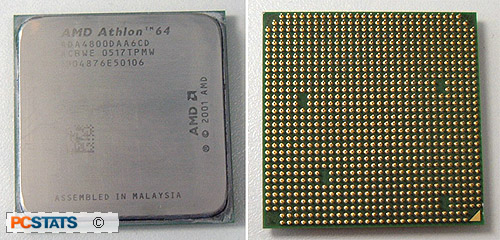If you want the best processor on the market there is
little doubt that it is going to be based on the AMD Athlon64 architecture. If
you are a true gaming enthusiast you're best off going with an Athlon64/FX
processor, those of you who need a multimedia powerhouse should stick to the
dual core AMD
Athlon64 X2. For the answers to "why" that is, keep on
reading...
Truth be told, the move towards dual core processors was made out of
necessity due to Intel and AMD hitting a roadblock with manufacturing
technologies. The old method of a "die shrink and ramp up speed" has reached its
limits, so a new game plan was hatched where two CPU cores were the next logical
step up.
While Intel has been quite coy with the benefits of dual core processors,
like that of the Pentium D 840, AMD has been very direct. Which is a nice
change in this industry. If gaming is your thing, stick with a faster single
core processor. If you are heavy into multimedia or content creation type
applications then you'll actually see benefit from a dual
core processor. As you will see shortly this is actually very good advice.
At the moment most desktop applications only take advantage of a single core,
but with both Intel and AMD pimping dual core technology as the next best thing
since sliced bread, you can bet software developers are feeling the pressure to
write applications that are dual core compatible, as standard. High end
workstations and servers have long benefited from SMP (Symmetrical
Multiprocessing) and its nice to see desktop users will soon realize this as
well.
It should also be noted that the Athlon64 X2 is compatible with every
Socket 939 motherboard on the planet right now (although a BIOS flash might
be necessary). Intel users who adopted Socket 775 systems pre-945P/955X chipsets
are probably fuming to hear that a new motherboard is required to use dual
core Pentium D processors.
With AMD leading the way on the processor front right now, you can bet
that PCSTATS made sure an AMD Athlon64 X2 4800+ processor arrived in the
labs to test out for our readers. After all, we keep getting questions that
start with the line; "Intel or AMD?" With a retail price of $1050 CDN ($880 US), the Athlon64 X2 4800+ is the very best
dual core desktop processor bar none, and bloody expensive to match!
 |
|
|
AMD Athlon64 X2 4800+ Processor |
|
|
 |
| Tech
Specs |
|
Clock: 2.4GHz
L1: 124KB
L2:
1024KB
Multipiler: 12x
Package: 939-pin
organic
mPGA
Core: 90nm SOI
Vcore: 1.3V
Cost: $880USD

| | |
Despite housing two cores, the Athlon64 X2 4800+ looks exactly the
same as the standard Athlon64 processor and will work in current Socket 939 motherboards, although a BIOS flash might be necessary before hand. The Athlon64 X2 4800+ processor
we're testing is based on the 'ACBWE' stepping, and was built in
week 17 of 2005 so it's literally hot off the
presses!
The integrated heatspreader protects the two
physical processor cores underneath (one one silicone die) which both run at a default speed of 2.4 GHz.
Both cores individually have 128KB of L1 cache and 1MB of L2 cache, so essentially
what we have here are the equivalents of two Athlon64 4000+ CPUs. Both cores share a single 128 bit DDR memory controller. This potentially means that the
individual cores will be starved for bandwidth (slightly) during high load times.
The Athlon64 X2 4800+ processor connects to the motherboard Northbridge chipset via a single
2 GHz (1 GHz up/down 16-bits wide both ways) Hypertransport link.
All Athlon64s, single core and dual, are manufactured at
AMDs fab in Dresden Germany. The X2 4800+ is built with 0.09 micron (90nm) manufacturing process, and weighs in with huge 233.2
million transistors count and a surface area of 199mm2 . Like its single
core counterparts, the Athlon64 X2 4800+ incorporates an improved memory
controller as well as new SSE3 instructions licensed from Intel. All this, and the processor runs on a default
voltage of just 1.3V, lower than its single core counterpart! Like the 'non FX'
Athlon64s, the X2 4800+ is multiplier limited so users can only select multipliers
from 12x and down.
If you want to learn more about dual core technologies, both AMD and Intel, PCSTATS has a great
article on the subject here. On the other hand if you'd like a little
background on 64-bit processors and what they brings to the table, please refer
to this article.
Next up, we walk the Athlon64 X2 4800+ through a few rounds
of overclocking!

